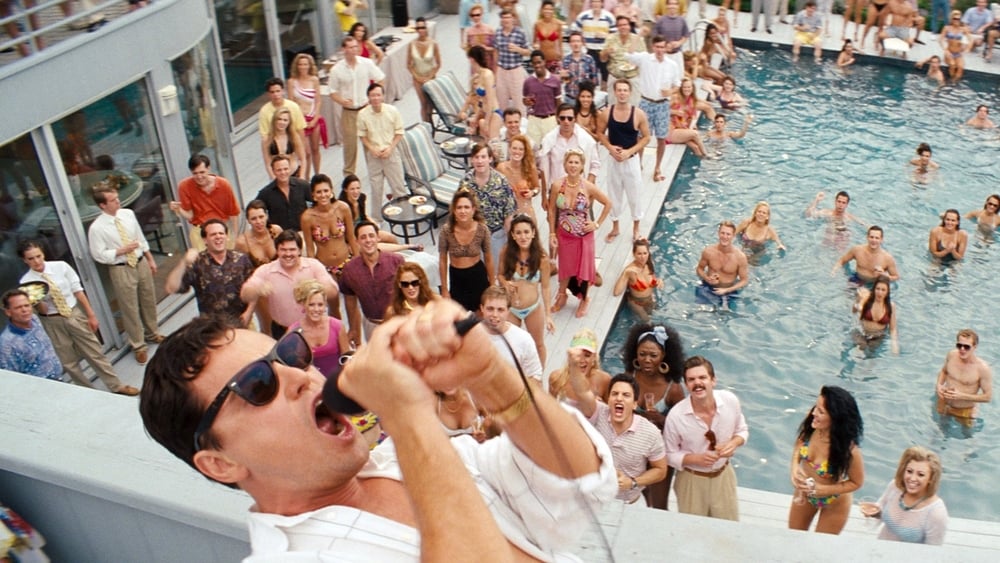I still can’t decide which group is more annoying. Is it the meathead business bros that want to be like the maniac Jordan Belfort, that believe ripping people off is okay actually because they are smarter than everyone and won’t get punished for it, that only seem to have watched the first half of the film that shows how glamorous everything is when you have money and power? Or is it the people that, ten years after its release, still argue that Martin Scorsese’s “The Wolf of Wall Street” condones the actions of its protagonist simply because a character doesn’t speak directly into the camera and tell you these people are bad (something that every ripoff of the tone and ideology of this movie since — *cough*Adam McKay*cough* — has felt obligated to do)?
When viewing the film after a decade of both groups trying to drag down its legacy, it’s best to ignore the circular discourse that inevitably pops up every time this movie gets mentioned. “The Wolf of Wall Street” is not anything these people say it is. Instead, it is one of the 21st century’s great capitalist critiques, a film that shows how the excess and grotesquery not only allowed but encouraged by American culture and policy in the late 20th century still plagues us today. It warned of the dangers a con man like Belfort could cause and the atrocities he would be allowed to get away with — something that resonates even more in a post-Trump America.
“The Wolf of Wall Street” is another in a long lineage of Scorsese crime epics about morally disgusting men taking advantage of Americans who don’t have much. His protagonists in these films are reverse Robin Hoods. But, while a younger Scorsese may have been more interested in finding nuance in the possible redemption of these characters, the filmmaker kicked off the late period of his career with a film that shows complete contempt for its subject. It is, admittedly, easy to overlook this. The story is told subjectively from Belfort’s perspective and does its best to fool you into thinking this guy is charming, sharp, and admirable. But this is Belfort trying to con you — a clever adaptation of his memoir that is obviously selling you his life story as aspirational. If you look past the con, which is apparently very difficult for some people, you see the inhuman buffoonery on display.
The film plays like what someone who wished to be the protagonist in a Scorsese movie would want one about his life to be. Every technique the filmmaker has mastered over his several decades of work is used to the point of absurd parody. The direct address to the audience points out unimportant things that Belfort finds worth talking about (like the color of his car), acts like the people around him who fail and put him at risk are somehow more idiotic than him, and gloats about how even getting caught isn’t that bad when you’re as rich as he is. The needle drops aren’t used to reveal character or themes but instead reflect the shallowness of the main character, using blues tracks simply because they’re cool rather than reckoning with the pain that underpins them and using bastardized covers of famous songs to show how Belfort and company cut corners because they stupidly don’t think people will notice a difference. The trailer, set to Kanye West’s “Black Skinhead,” is a perfect encapsulation of everything Belfort is — a narcissist who thinks he’s a rebel pushing back against the system by doing something illegal but is really someone who just reinforces the strength of the status quo.
Scorsese’s films have always dealt with the ugliness of American society (at least the ones that take place here), but his last few films have been far more downbeat than previous works. These movies aren’t fun anymore because there’s no fun left. There is no more search for redemption because there is none for these people. “The Wolf of Wall Street” is one last debaucherous party before the wake-up call. America is beyond repair if we let people like this run our country, cheered on by millions who want to be just like them but never will because of an economic system built to keep them down unless they destroy each other to claw their way to the top. These are cynical films for cynical times. No artist could do them better than Scorsese.

